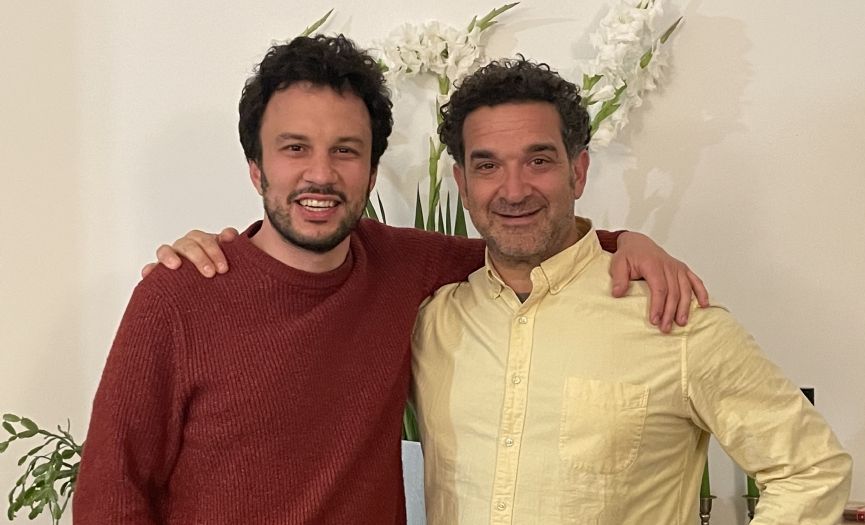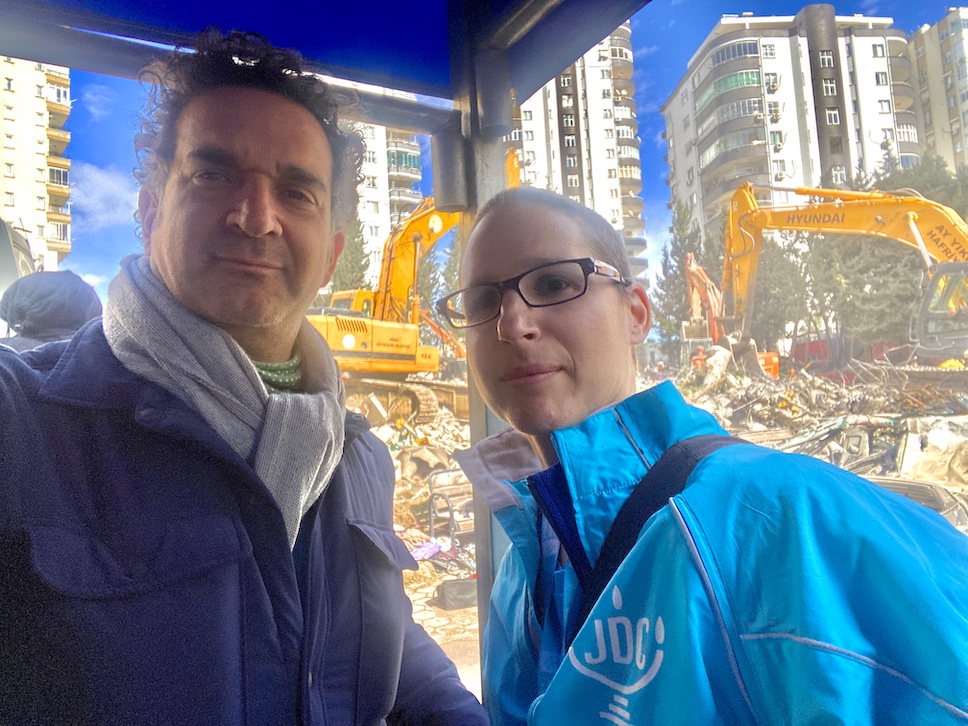
When ´Tikkun Olam´ Joins Hands With "Peace At Home, Peace In the World!"
I met with Sam Amiel, the Regional Director of JDC, the Jewish Relief Organization, who came to our country following the earthquake disaster. We discussed the JDC´s contributions to the relief efforts in the earthquake region.
On the 6th of February 2023, two major earthquakes only 8 hours apart from each other struck the Turkish borders of the Fertile Crescent! 11 cities were directly affected by the earthquake. With more than 45 thousand people dying and more than 100 thousand buildings being severely damaged, Turkey was simply overwhelmed by the magnitude of this disaster. Countries from all around the world started to send help to Turkey. It was a moving scene for me, as a Turkish citizen, to see people from various countries around the globe rushing to help the victims of the earthquake.
The spirit of tikkun olam (The repair of the world) was one of the many caring hands to extend its humanitarian help to Turkey through the American Jewish Joint Distribution Committee (JDC), colloquially known as “the Joint”. My interviewee Sam Amiel, who is the Country Director for Turkey, informed me that the Joint is an old partner of Turkey. Interestingly, “the foundation of the Joint is credited to the call for help coming from a cablegram of the American Ambassador to Constantinople, then Ottoman Empire, to Jacob Schiff, a Jewish philanthropist residing in New York City. The cablegram is regarded as the founding initiative of the Joint. It was asking for economic support to help create a war fund to aid Jews of Eastern Europe and Palestine in the Ottoman Empire, during the Great War (World War I).”
Sam Amiel was born in Seattle and has been residing in Israel for 25 years. He is a descendent of a Turkish Sephardic Jewish family from Edirne and was one of the early responders to the silent call for help coming from under the thousands of collapsed houses. He refers to himself as a “proud Turkish Jew” and has been part of the Joint for 25 years, succeeding the late Ami Bergman, who was well known within the Turkish Jewish community. Amiel set boot on the ground with his colleague Leora Wine, the Director of Disaster Response in the Joint, within 30 hours of the first earthquake that hit the region at 04:17 am. I asked Sam Amiel whether the decision to deploy aid came in the structure of a “chain of command” and he replied with a simple “No!”. “The GRID (Global Response and International Development, Küresel Müdahale ve Uluslararası Kalkınma) monitors natural and manmade disasters around the world and the JDC will respond to substantial disasters on behalf of the American Jewry. We open a funding mailbox and American Jewry depends on the JDC to respond to global disasters, without a Jewish agenda, however, if there are native Jews in the disaster area, that makes it twice as more important to show the appropriate response, as it was the case in Antioch.” To me this reflected a culture or a collective memory whose natural response was rushing to help those in need, just like a reflex.

Sam Amiel and Leora Wine
Of course, the Joint is not alone in this effort and particularly in their non-sectarian efforts they partner up with local organizations. The Joint was present in several cities within 30-48h after the first earthquake in Kahramanmaraş, including Adana, Osmaniye and Gaziantep. The Joint has developed partnerships over the years and with their help they have been able to gain access to the region to assess the severity of the situation. The International Blue Crescent (IBC) is one of the major partners of the Joint and already after the 1999 earthquake in Gölcük, as well as the earthquake in Van (2011), the Joint funded the relief efforts of the IBC. Amiel added that “the Joint doesn’t work directly with individuals, we focus on working with organizations or communities. Our main partner in Turkey is of course the Chief Rabbinate in Istanbul.” Amiel continued “Our response in disaster zones often involves partnership with the Jewish community, for example together we rebuilt a school in Van, that was destroyed by the earthquake, and we still maintain relationship with those people”. “Of course, the JDC is not doing this in a vacuum. It was extremely touching to see how our partners both the Jewish community being able to respond to a disaster as citizens in their home country and we as a global response organization being able to work with and empower our Jewish community partners to do that.“
It is important for the JDC to be on the ground, gather information regarding local Jews and inform our donors of their situation to make sure that funds are being given to continue these aids. With this mechanism our donors through the JDC hope to make a big developmental impact on the ground.
The work of the Joint is continuous and not limited to disaster response. It doesn’t only respond to crises, but also actively monitors and helps communities, making sure they develop and survive. When asked more about the primary function of the Joint, Amiel tells me that the Joint is focused on the wellbeing of Jewish communities outside of the US, working like the “giant behind the scenes”, by supporting communities. “The Joint addresses the community’s welfare needs, helps build stability and resilience. We offer technical assistance and economic support. But our actual success is measured by the need for the Joint: If a community provides effective and impactful services to its members, this is considered as success. The less there is need for the Joint, the more successful we consider ourselves.”
When approaching a community, the Joint focuses on the most vulnerable. The elderly and the poor of a society are often the ones most in need. The cooperation of the Joint with Barınyurt Old Age House elderly houses, as well as the Or-Ahayim hospital are some of the examples of how JDC supports the vulnerable in a community in Turkey. A plaque of the Joint can be found even in Barınyurt as one of its main donors.
Of course, supporting a community does not end with the vulnerable. A society, like an organism, is an evolving and developing entity, where its youth represents its future. The Joint takes extra interest in supporting the youth of the Jewish Community by providing them or the Jewish School, such as the Ulus Musevî Lisesi, economic support in helping them create new programs to help the Jewish identity survive and the Jewish youth make an impact in the society in which they live.
Finally, Amiel puts extra emphasis on the fact that the Joint is definitely an non-political organization. When asked if the JDC partnered with Kızılay, Amiel said that the main mechanism of action is to work through the local Jewish community or other non-governmental organizations. “The JDC does not support individuals directly, rather expects local communities to help support the individuals in need, and it traditionally does not partner with governmental organizations”. Amiel mentions the Empati Organization in Gaziantep and the International Blue Cresent, as examples of very reliable and local effective NGO partners to provide support to. “We partner with organizations that are local and are up to international standards of transparency and due diligence”.
The Joint has been a long-standing partner of the Jewish Community in Turkey. Today the liaison is managed by a Turkish Jew, for whom this work is not only a professional task, but also an opportunity to connect with his roots of Turkish Sephardism. Amiel concludes our interview with the words “Unfortunately, the Jewish community in Turkey is shrinking in size, but the “the quiet giant behind the scenes” wishes to remind them they are ready to help not only the community to become resilient and prosperous, but also their fellow citizens and historical partners when in dire need…”
Related News









